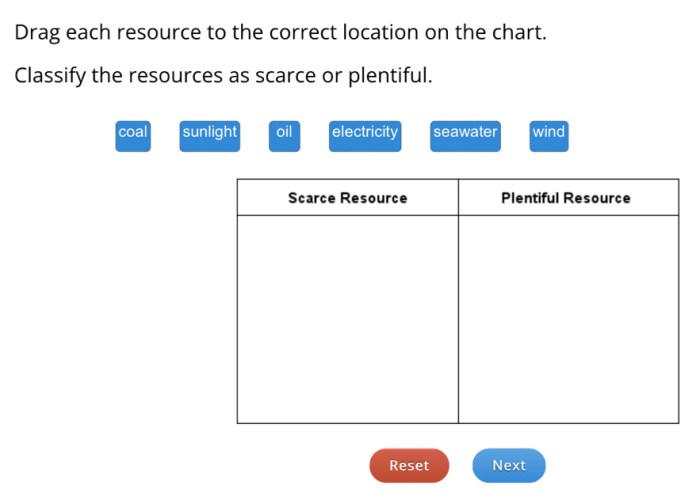Resources are scarce for households but plentiful for economies, a paradox that shapes our world. This disparity has profound implications for household well-being, economic growth, and social equity, demanding our attention and innovative solutions.
Households face resource scarcity due to limited income, rising costs, and uncertain employment. This scarcity impacts their ability to meet basic needs, make informed decisions, and improve their quality of life. In contrast, economies benefit from abundant resources, driven by technological advancements, globalization, and economies of scale.
This abundance fuels economic growth, creates jobs, and enhances living standards.
Scarcity of Resources for Households: Resources Are Scarce For Households But Plentiful For Economies
Households often face scarcity of resources due to factors such as limited income, rising costs of living, and lack of access to essential services. This scarcity impacts household budgets and decision-making, leading to challenges in meeting basic needs, maintaining a decent standard of living, and planning for the future.
Consequences of Resource Scarcity
- Increased financial stress and debt
- Reduced access to healthcare, education, and other essential services
- Poor housing conditions and overcrowding
- Food insecurity and malnutrition
- Increased vulnerability to economic shocks and emergencies
Abundance of Resources for Economies
Economies may experience abundance of resources due to factors such as natural resource wealth, technological advancements, and a skilled workforce. This abundance can contribute to economic growth and development by providing raw materials, capital, and human capital for production.
Challenges and Opportunities of Resource Abundance
- Dutch disease: over-reliance on resource exports leading to neglect of other industries
- Environmental degradation and resource depletion
- Social inequality and conflict
- Opportunities for economic diversification and sustainable development
- Increased investment in infrastructure and public services
Disparities in Resource Distribution

Disparities in resource distribution between households and economies arise due to factors such as unequal income distribution, unequal access to education and healthcare, and differences in political and economic power. These disparities can lead to social inequity and economic instability.
Implications of Resource Disparities, Resources are scarce for households but plentiful for economies
- Increased poverty and social exclusion
- Limited economic mobility and opportunity
- Social unrest and political instability
- Environmental degradation due to unequal access to resources
- Need for policies to address inequality and promote social justice
Strategies for Addressing Resource Scarcity
| Strategy | Description | Advantages | Disadvantages |
|---|---|---|---|
| Income generation | Increasing household income through employment, entrepreneurship, or government assistance | Provides financial stability and reduces reliance on external resources | Can be challenging for low-skilled workers or those with limited opportunities |
| Resource management | Efficient use of existing resources through conservation, energy efficiency, and waste reduction | Reduces household expenses and environmental impact | May require initial investment or behavioral changes |
| Community support | Mobilizing community resources such as food banks, shelters, and social services | Provides essential support for vulnerable households | Relies on donations and volunteers, which may be limited |
| Government assistance | Providing financial assistance, housing subsidies, or job training programs | Directly addresses household needs and promotes social equity | Can be costly and may create dependency |
Policies for Managing Resource Abundance

- Sustainable resource extraction practices to minimize environmental impact
- Diversification of economic activities to reduce reliance on resource exports
- Investment in education and healthcare to enhance human capital
- Establishment of sovereign wealth funds to manage resource revenues wisely
- Addressing social and environmental impacts of resource extraction
Technological Innovations for Resource Optimization
| Technology | Description | Applications | Potential Impact |
|---|---|---|---|
| Smart grids | Optimizing energy distribution and reducing consumption | Homes, businesses, and communities | Reduced energy costs and emissions |
| Water-efficient appliances | Reducing water consumption in households | Washing machines, dishwashers, toilets | Water conservation and lower utility bills |
| Solar panels | Generating renewable energy for households | Roofs and other suitable surfaces | Reduced energy dependence and environmental impact |
| Precision agriculture | Optimizing crop yields and reducing environmental impact | Farms and agricultural operations | Increased food production and sustainability |
Education and Awareness about Resource Management
Educating households and businesses about responsible resource management is crucial for promoting sustainable practices and reducing resource scarcity. This can be done through media campaigns, school curricula, and community outreach programs.
Effective Educational Campaigns
- Use clear and relatable language
- Provide practical tips and resources
- Highlight the benefits of resource conservation
- Involve community leaders and role models
- Monitor and evaluate campaign impact
International Cooperation for Resource Allocation

International cooperation is essential for allocating resources fairly and sustainably. This involves global resource governance, agreements on resource sharing, and addressing environmental concerns related to resource extraction and consumption.
Challenges and Opportunities
- Balancing economic development with environmental protection
- Addressing inequalities between resource-rich and resource-poor countries
- Promoting sustainable resource management practices globally
- Opportunities for technology transfer and capacity building
- Strengthening international institutions for resource governance
Popular Questions
Why are resources scarce for households?
Limited income, rising costs, and uncertain employment contribute to resource scarcity for households.
How does resource abundance benefit economies?
Resource abundance fuels economic growth, creates jobs, and enhances living standards.
What are the challenges of managing resource abundance?
Ensuring sustainable extraction, diversifying economic activities, and addressing social and environmental impacts are key challenges.